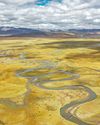
Everybody knows about this imaginary line on the Earth’s surface that lies equidistant from the North Pole and the South Pole. Almost half the world’s rainforests are concentrated on the equator, and, naturally, it serves as the world’s greatest concentration of natural biodiversity. From its seasons to its people, the equatorial region is a unique and fascinating place.
What Is the Equator?
An invisible line that runs around the centre of the Earth at zero degrees latitude, the Equator may not seem like the most exciting line of topic. Halfway between the North Pole and the South Pole, the equator divides the planet into the Northern Hemisphere and the Southern Hemisphere. This roughly 40,075-kilometre line is where the Earth is at its widest. Some 78.8 percent of the equator lies across water, with the remaining 21.3 percent over land, and it crosses 13 countries over three continents – Ecuador, Colombia, Brazil, São Tomé and Príncipe, Gabon, Republic of the Congo, Democratic Republic of the Congo, Uganda, Kenya, Somalia, Maldives, Indonesia, and Kiribati. Indonesia sits on the greatest length of the equatorial line across both land and sea.
It seems like things are starting to get a little interesting now.
The Earth bulges slightly at the equator, which means that sea levels are slightly higher in equatorial regions than near the poles, and the Earth’s gravitational pull is slightly weaker at the equator.
This story is from the {{IssueName}} edition of {{MagazineName}}.
Start your 7-day Magzter GOLD free trial to access thousands of curated premium stories, and 9,000+ magazines and newspapers.
Already a subscriber ? Sign In
This story is from the {{IssueName}} edition of {{MagazineName}}.
Start your 7-day Magzter GOLD free trial to access thousands of curated premium stories, and 9,000+ magazines and newspapers.
Already a subscriber? Sign In

A Spectrum Of Scarlet: The Symbolic Red Of Asian Flags
A common thread that unites many Asian flags is the prominent use of red, a colour rich with symbolism

Curry: A World of Flavour, Tradition, and Culture
From its humble beginnings in India, the concept of "curry" has evolved into a culinary language understood around the world

The Power Of Asian Red Fruits - Discover 10 Nutrient-Rich Gems Of The East
In the vast tapestry of Nature, Asia has gifted the world an array of unique and vibrant fruits, particularly those in shades of red. These scarlet-hued gems, packed with flavour and nutrients, not only add a burst of colour to your plate but also carry valuable health benefits. From antioxidant-rich goji berries to the exotic dragon fruit, let's explore some of the most popular red fruits from Asia and discover why they should be part of your diet.

Bhutan: A World Of Its Own
With its majestic monasteries, red-robed monks, charming rural villages, and vibrant festivals, the Kingdom of Bhutan is a Himalayan paradise that promises an enriching travel experience like no other

Take The Red Pill
From the vermilion torii gates of Japan to the famed rust-hued walls of India's Agra Fort, the burgundy robes of Burmese monks to scarlet chillies drying in the Bangladeshi sun, red is the quintessential colour of Asia.

70 Days for Our Land Animals
Raising awareness about conservation, the environment, and the land-dwelling species of the world

The Red Panda
Meet the elusive guardian of the Eastern Himalayas

Revealed Doctor Yellow
Japan Railways' special lemony Shinkansen is a rare sight to behold

The Mighty Yellow
Over 5,000 kilometres long and flowing through nine provinces and autonomous regions, the Yellow River is China's second largest, after the Yangtze, while its basin is deemed the cradle of Chinese civilisation

Wildlife Big Yellow Beauty
The popular "amelanistic" form of the Burmese python is considered among the most beautiful snakes - if that's your sort of thing